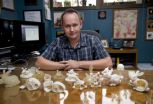Funding for medical research and science programs faces draconian cuts
2012-09-19
(Press-News.org) Bethesda, MD – A new report from the Office of Management and Budget (OMB) is a stark reminder of the perilous situation facing the medical research and scientific communities unless Congress and the President take action to prevent the pending sequestration. Set in motion by the Budget Control Act of 2011, sequestration would impose automatic cuts on federal funding starting on January 2, 2013. According to OMB, the budget for the National Institutes of Health (NIH) would be reduced by $2.529 billion, the National Science Foundation would lose $586 million, and the Department of Energy Office of Science would be cut by $400 million. "Federal funding for research programs are not the source of our nation's debt, and cuts to these and other programs are not the solution to our fiscal problems. We urge our elected leaders to act expeditiously to avoid the catastrophic consequences of sequestration and enable federal agencies to plan for the coming year," said Federation of American Societies for Experimental Biology (FASEB) President Judith S. Bond, PhD.
"The loss of funds due to sequestration will curtail vital research projects at universities and institutions in all 50 states and result in layoffs of thousands of Americans," noted Dr. Bond. FASEB has projected NIH extramural research funding will decline by $2.6 billion if sequestration goes into effect. Eight states face funding reductions that will exceed $100 million. The complete analysis, including a table detailing the state-by-state cuts from sequestration, is available here.
INFORMATION:
FASEB is composed of 26 societies with more than 100,000 members, making it the largest coalition of biomedical research associations in the United States. Celebrating 100 Years of Advancing the Life Sciences in 2012, FASEB is rededicating its efforts to advance health and well-being by promoting progress and education in biological and biomedical sciences through service to our member societies and collaborative advocacy.
END
ELSE PRESS RELEASES FROM THIS DATE:
2012-09-19
Researchers Patricia A. Champion and Matthew Champion from the University of Notre Dame's Eck Institute for Global Health have developed a method to directly detect bacterial protein secretion, which could provide new insights into a variety of diseases including tuberculosis.
The Champions point out that bacteria use a variety of secretion systems to transport proteins beyond their cell membrane in order to interact with their environment. For bacterial pathogens like TB these systems transport bacterial proteins that promote interaction with host cells, leading to ...
2012-09-19
VIDEO:
University of Iowa researchers have determined that thigh size in obese people is a reason their hip implants are more likely to fail.
Click here for more information.
University of Iowa researchers have determined that thigh size in obese people is a reason their hip implants are more likely to fail.
In a study, the team simulated hip dislocations as they occur in humans and determined that increased thigh girth creates hip instability in morbidly obese patients (those ...
2012-09-19
A once-promising discovery linking prostate cancer to an obscure retrovirus derived from mice was the result of an inadvertent laboratory contamination, a forensic analysis of tissue samples and lab experiments – some dating back nearly a decade – has confirmed.
The connection, which scientists have questioned repeatedly over the last couple years, was first proposed more than six years ago, when the telltale signature of the virus, known as XMRV, was detected in genetic material derived from tissue samples taken from men with prostate cancer.
Later studies failed ...
2012-09-19
MADISON — Pacifiers may stunt the emotional development of baby boys by robbing them of the opportunity to try on facial expressions during infancy.
Three experiments by a team of researchers led by psychologists from the University of Wisconsin–Madison tie heavy pacifier use as a young child to poor results on various measures of emotional maturity.
The study, published today by the journal Basic and Applied Social Psychology, is the first to associate pacifiers with psychological consequences. The World Health Organization and American Academy of Pediatrics already ...
2012-09-19
Writer: Emil Venere, 765-494-4709, venere@purdue.edu
Source: Bedrich Benes, 765-496-2954, bbenes@purdue.edu
Related websites:
Bedrich Benes: http://www.tech.purdue.edu/CGT/Faculty-And-Staff/index.cfm?dept=Computer%20Graphics%20Technology&id=120
IMAGE CAPTION:
Bedrich Benes, an associate professor of computer graphics at Purdue University, is working with Advanced Technology Labs of Adobe Inc. to develop a computer program that automatically strengthens objects created using 3-D printing. The innovation is needed because the printed fabrications are often fragile ...
2012-09-19
Inflammation is the hallmark of many human diseases, from infection to neurodegeneration. The chemical balance within a tissue is disturbed, resulting in the accumulation of reactive oxygen species (ROS) such as hydrogen peroxide, which can cause oxidative stress and associated toxic effects.
Although some ROS are important in cell signaling and the body's defense mechanisms, these chemicals also contribute to and are indicators of many diseases, including cardiovascular dysfunction. A non-invasive way of detecting measurable, low levels of hydrogen peroxide and ...
2012-09-19
MADISON -- Among his many qualities, the pioneering wildlife ecologist Aldo Leopold was a meticulous taker of field notes.
Rising before daylight and perched on a bench at his Sauk County shack in Depression-era Wisconsin, Leopold routinely took notes on the dawn chorus of birds. Beginning with the first pre-dawn calls of the indigo bunting or robin, Leopold would jot down in tidy script the bird songs he heard, when he heard them, and details such as the light level when they first sang. He also mapped the territories of the birds near his shack, so he knew where the ...
2012-09-19
HOUSTON – (Sept. 18, 2012) – Contrary to the prevailing theories that music and language are cognitively separate or that music is a byproduct of language, theorists at Rice University's Shepherd School of Music and the University of Maryland, College Park (UMCP) advocate that music underlies the ability to acquire language.
"Spoken language is a special type of music," said Anthony Brandt, co-author of a theory paper published online this month in the journal Frontiers in Cognitive Auditory Neuroscience. "Language is typically viewed as fundamental to human intelligence, ...
2012-09-19
Although depression and prejudice traditionally fall into different areas of study and treatment, a new article suggests that many cases of depression may be caused by prejudice from the self or from another person. In an article published in the September 2012 issue of Perspectives on Psychological Science, a journal of the Association for Psychological Science, William Cox of the University of Wisconsin-Madison and colleagues argue that prejudice and depression are fundamentally connected.
Consider the following sentence: "I really hate _____. I hate the way _____ look. ...
2012-09-19
While wave watching is a favorite pastime of beachgoers, few notice what is happening in the shallowest water. A closer look by two University of Colorado Boulder applied mathematicians has led to the discovery of interacting X- and Y-shaped ocean waves that may help explain why some tsunamis are able to wreak so much havoc.
Professor Mark Ablowitz and doctoral student Douglas Baldwin repeatedly observed such wave interactions in ankle-deep water at both Nuevo Vallarta, Mexico, and Venice Beach, Calif., in the Pacific Ocean -- interactions that were thought to be very ...
LAST 30 PRESS RELEASES:
[Press-News.org] Funding for medical research and science programs faces draconian cuts



